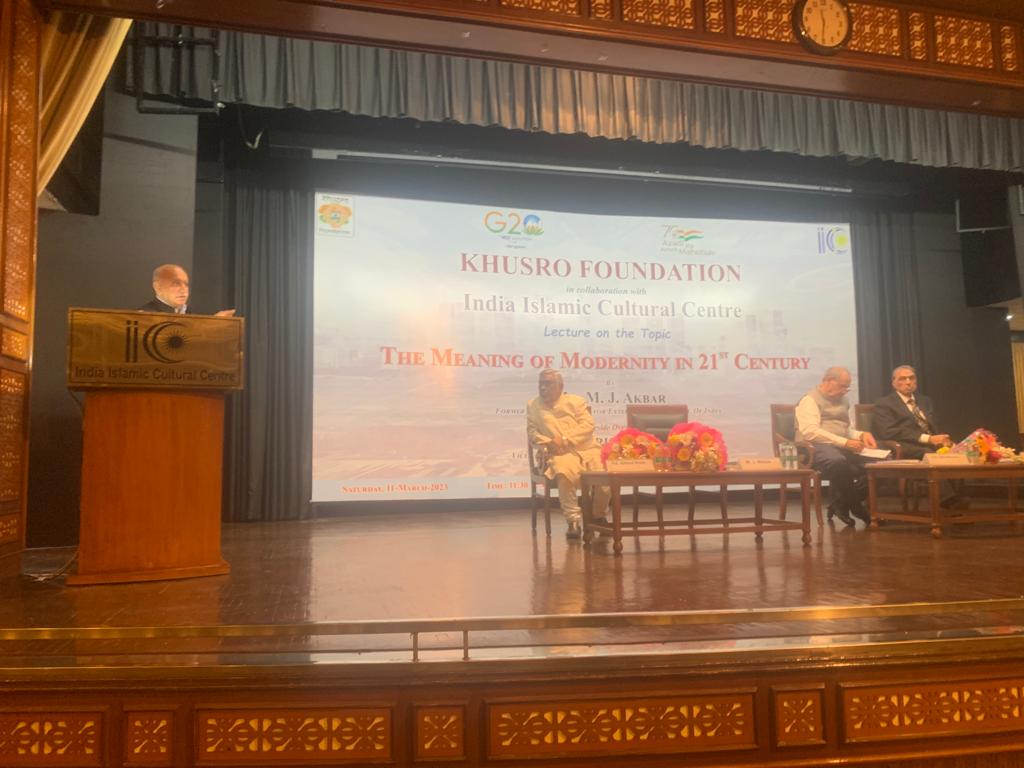By S A H Rizvi
The Times Kuwait Bureau Chief,
New Delhi
Former Indian Minister for External Affairs and renowned journalist/writer M J Akbar has said that secularism as enshrined in the Constitution is deeply entrenched in Indian soul and society that has kept the nation united and progressive.
“I have no hesitation to say the secularism as our tenet has largely helped India to maintain its unique character and vacillation on this score would have had disastrous impact on the nation” Akbar told a huge gathering which had gathered to listen to him in New Delhi.
Our secular concept is at variant with the west where religion is segregated from state but for us it mans that all religion has a constitutional right to profess and practice their belief with the state playing no role. “This model has worked or less the Indian society would have been living in separate compartment with no interaction among themselves”.
Akbar was delivering a lecture on “The Meaning of Modernity in 21st Century” organised by the Khusro Foundation at the India Islamic Cultural Centre this Monday. Vice Chancellor of Aligarh Muslim University Tariq Mansoor presided over the function.
What he called his genuine belief that India will be the defining nation of the 21st century. He asked the audience, “What makes me make such an ambitious claim? A claim that could be dismissed as ultra-nationalism,” before delving into a bit of the country’s historical background.
He explained that centuries ago, we were a wealthy country; we had science and technology. And that if India began the history of European colonisation, India can begin the history of decolonisation as well. “But the real historical moment is much larger than the collapse of colonisation,” he claimed.
Between 1850 and 1950 every single empire known in history collapsed. The Chinese, Japanese, Indian, Ottoman and Russian empires among the world’s greatest empires collapsed. Every single political structure that held the world together encountered this. And as these structures collapsed, the idea of the nation-state began to replace them.
Bringing the discussion back to the present, MJ Akbar then stated that the real challenge of the moment is in finding out what modern nations do with nationalism. This, he said, is where the Indian Constitution becomes the most important document of the postcolonial world and for the postcolonial world. According to him, at its essence, the Constitution defines the meaning of modernism and not merely nationalism.
On the modernity how this part of the world lagged behind he cited the development of printing press that changed the landscape in the west. “ The mass printing created a very educated middle class who took to inventions seriously that led to the industrial revolution in the west as early as 17th century”
Several empires like the Mughal Rajput rule in India, Ottoman in the Middle east or the the Chinese were oblivious the change the west was undergoing. “It was the tool that led to growth of colonialism and imperialism by the west”
All technological advancement were taking place in the west and this part of the world was struggling to evolve and cope with the industrial revolution, lagging far behind.
Akbar also had a word of praise for Mahatma Gandhi who he said was keen to address the problem of hunger and poverty. “ His Khadi movement was all directed to empower the poor and downtrodden and that spirit continues till today”
Akbar said that even in the modernity of the 21st century we gave more privileges to the women; took concrete steps towards their empowerment unlike the West where women in Switzerland were given voting rights in 1971 and in France in 1945. “But here the women were a part of the democratic process from the beginning”.
Thus, he said modernity in 21st century has several paradigms. “We should also be proud that how India provided food and other items to such a large population during the pandemic while ensuring it reaches to the last of the beneficiary. Even today the government has opened up its arms by providing foodgrains and other essential items to the millions of needy across the country”
In his address, AMU Vice Chancellor said education will play a key role in setting up a new horizon to take and develop the Indian society in the 21st century.

